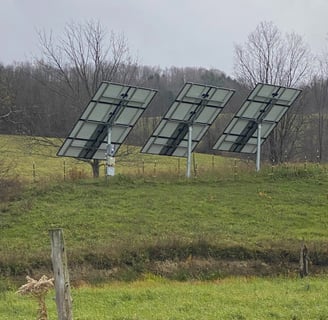Thinking About Living Off The Grid; What Does That Mean?
What does it mean to living off the grid with energy independence, water sourcing, and food production? Embrace self-sufficiency and sustainability your way.
1/15/20252 min read


What Does It Mean to Live Off the Grid?
Living off the grid is a lifestyle choice that escapes reliance on public utilities and infrastructure. Often seen as a means to achieve greater independence, it involves generating one’s own energy, sourcing food, and managing water without conventional systems. Understanding this concept might seem daunting or entirely foreign for individuals who have always lived connected to public power sources. However, it fundamentally embodies the pursuit of self-sufficiency and sustainability.
The Key Aspects of Off-Grid Living
At its core, off-grid living revolves around three essential components: energy generation, water procurement, and food production. Energy can be produced using renewable sources such as solar panels or wind turbines, allowing individuals to power their homes without any connection to a public grid. Water is often collected from rain, while food can be grown in personal gardens or sourced from local markets. Each of these elements serves to create an independent and sustainable lifestyle.
Benefits and Challenges of Embracing Off-Grid Living
Choosing to live off the grid presents numerous benefits. It fosters a deep connection with nature and promotes sustainability by reducing reliance on nonrenewable resources. Additionally, it provides a level of tranquility that may be absent in urban environments, offering a serene way of life that many find appealing. However, it is not without its challenges. Off-grid living requires significant preparation, knowledge, and, sometimes, a degree of sacrifice. The process of transitioning to this lifestyle may demand substantial investments of time and resources, and the absence of public services can lead to feelings of isolation. Adapting to this new reality can be a steep learning curve for someone who has never experienced life beyond public power sources. It's up to you to fix the outage when something goes wrong. Whether you do it or hire someone, the responsibility is yours. However, having more than one source of power and backup systems in place will ensure you never run out of power.
In summary, living off the grid embodies a commitment to self-reliance and environmental stewardship. It signifies a departure from conventional comforts in pursuit of a lifestyle that prioritizes sustainability and independent living. While the journey may be challenging, the rewards of personal independence and a closer connection to the environment make it an increasingly attractive option for individuals seeking a change from modern life.
Homesteading Life Guidance
Empowering urban families to embrace homesteading independence.
Resources
Community
info@homesteadinglifeguidance.com
